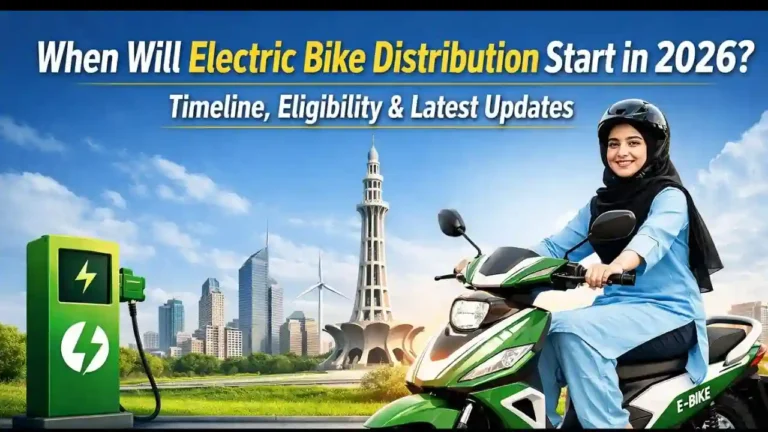30 Electric Buses to Operate on Seven Routes in Faisalabad | Punjab Green Initiative 2025

30 Electric Buses to Operate on Seven Routes in Faisalabad under the Punjab Green Initiative 2025, marking a historic step towards clean and affordable public transport in the city. With the arrival of these modern e-buses, Faisalabad is all set to reduce traffic congestion, improve urban mobility, and cut down on harmful emissions that have long troubled its residents.
Faisalabad, often called the “Manchester of Pakistan” due to its booming textile industry, is home to more than 4 million people. Despite its economic importance, the city has long struggled with overcrowded wagons, rising fuel prices, and worsening air pollution. The introduction of electric buses promises not only to provide affordable travel but also to transform how citizens move across industrial, residential, and commercial areas.
According to district officials, the first phase includes 30 electric buses operating on seven major city routes, supported by three purpose-built depots at Ghulam Muhammad Abad, Sargodha Road, and Gutwala Road. The project will be inaugurated by Chief Minister Maryam Nawaz in the coming days, and authorities believe it will become a model of sustainable urban transport for other cities in Punjab.
Why Faisalabad Needed Electric Buses
Faisalabad is a city of over 4 million residents, famous as the “Manchester of Pakistan” due to its textile industry. Despite being an economic powerhouse, the city has struggled with:
- Traffic congestion on main arteries such as Sargodha Road, Jaranwala Road, and Samundri Road.
- Rising fuel prices, making transport unaffordable for students and workers.
- Poor air quality, ranked among the worst in Pakistan, due to vehicle emissions and industrial pollution.
- Limited public transport options, forcing reliance on wagons, rickshaws, and private vehicles.
The introduction of electric buses is designed to tackle all these challenges at once, making travel more affordable while reducing the environmental burden.
Check Also: Chinese Luxury EV Zeekr 009 Launched in Pakistan | Specs, Price & Features
Key Features of the Electric Bus Project
1. Modern Fleet with Global Standards
The fleet consists of 30 modern, air-conditioned, low-floor electric buses. Each bus includes:
- Seating for 40–45 passengers with additional standing capacity.
- Wheelchair accessibility for disabled citizens.
- Air conditioning and comfortable seating for long commutes.
- Digital route display systems for easy navigation.
- Safety features like CCTV surveillance, fire suppression systems, and panic alarms.
2. Battery and Charging System
While exact specifications have not been made public, similar electric bus projects in Lahore and Karachi use buses with:
- Battery capacity: 250–300 kWh
- Range: 200–250 km on a single charge
- Fast charging stations at depots (taking 1–2 hours for full recharge)
- Life span: 8–10 years for the battery packs
Three charging depots in Ghulam Muhammad Abad, Sargodha Road, and Gutwala Road will ensure uninterrupted service.
3. Affordability and Accessibility
The Punjab Government has emphasized that fares will be low and subsidized, especially for:
- Students commuting daily to schools, colleges, and universities.
- Elderly citizens who require accessible and affordable transport.
- Low-income workers traveling to industrial areas.
The fare system may also integrate T-Cash smart cards, making payment digital and hassle-free.
Expected Routes – Connecting Faisalabad’s Heart
Although official route maps are yet to be released, local transport experts suggest the seven routes will cover Faisalabad’s busiest corridors:
- Clock Tower (Ghanta Ghar) to Ghulam Muhammad Abad – Connecting Faisalabad’s historic center with a dense residential zone.
- Sargodha Road to Jaranwala Road – Covering educational and industrial hubs.
- Gutwala Road to Faisalabad Railway Station – Linking commuters directly to intercity transport.
- People’s Colony to D Ground Commercial Area – Serving business districts and offices.
- Industrial Area to University of Agriculture Faisalabad – Providing relief to thousands of students.
- Madina Town to Canal Road – Covering upscale neighborhoods and family commuters.
- Samundri Road to Main Bazar – Serving low-income areas with high commuter demand.
These routes have been carefully chosen to balance residential, industrial, and commercial demand.
Check Also: Sindh Govt Awards E-Bikes to Top Public College Students 2025
Voices from the City – Public Response
Local residents have already expressed excitement:
- Ali Raza, a textile worker:
“I spend nearly 20% of my salary on daily transport. If fares are low, these buses will change our lives.” - Sara Khan, a student of Agriculture University:
“Affordable and safe buses mean we no longer have to depend on overcrowded wagons. This is a big relief.” - Retired teacher Mrs. Humaira:
“As a senior citizen, climbing into wagons was always difficult. A low-floor bus with air conditioning is a blessing.”
Such testimonies highlight the social impact beyond just mobility.
Environmental Benefits
One of the strongest motivations for the project is the environmental crisis. Faisalabad ranks among the top polluted cities in Pakistan. Electric buses will help by:
- Reducing carbon dioxide and nitrogen oxide emissions.
- Cutting noise pollution, since e-buses run silently.
- Supporting Pakistan’s COP climate commitments.
- Reducing reliance on imported fuel, saving millions in foreign reserves.
If successful, Faisalabad could become a model city for green transport in Pakistan.
Check Also: Honda WN7 Electric Motorcycle 2025 – Price, Specs & Launch Details
Punjab’s Green Initiative 2025 – Bigger Picture
The e-bus project in Faisalabad is just one part of a much larger plan. The Punjab Green Initiative 2025 includes:
- Transitioning major cities like Lahore, Rawalpindi, Multan, and Faisalabad to e-mobility.
- Developing metro feeder routes integrated with electric bus systems.
- Building EV charging infrastructure across the province.
- Encouraging public-private partnerships for sustainable urban transport.
CM Maryam Nawaz has personally championed these efforts, promising transparency and modern systems free from corruption and mismanagement.
Comparison with Global Electric Bus Systems
Faisalabad’s electric bus project may be new for Pakistan, but globally:
- China operates the world’s largest electric bus fleet with over 400,000 buses.
- India has rolled out electric buses in Delhi, Mumbai, and Bangalore.
- Turkey and UAE have also begun pilot projects to reduce fossil fuel dependency.
By adopting similar strategies, Pakistan is joining the global movement towards green, affordable, and sustainable transport.
CHeck Also: Japanese Terra Motors to Launch Kyoro Electric Rickshaw in Pakistan with 200 Km Range 2025
Impact on Faisalabad’s Economy
Direct Benefits
- Job creation for drivers, technicians, and depot staff.
- Lower transport costs for workers, improving industrial productivity.
- Boost to local businesses around bus routes due to increased accessibility.
Indirect Benefits
- Reduced health costs due to better air quality.
- Improved student attendance in schools and colleges due to affordable travel.
- Long-term economic resilience as the city reduces dependency on expensive fuel imports.
Future Expansion Plans
Officials have hinted that if Faisalabad’s pilot project succeeds:
- The fleet will expand beyond 30 buses.
- Routes may be extended to suburban areas like Khurrianwala and Samundri.
- Integration with metro and BRT systems in Punjab is possible.
- Eventually, Faisalabad could host 100+ e-buses, transforming its transport landscape.
Challenges Ahead
Despite the excitement, challenges remain:
- High upfront cost of electric buses compared to diesel buses.
- Battery replacement costs after 8–10 years.
- Public adaptation to new transport culture.
- Need for uninterrupted electricity supply for charging depots.
The government’s long-term commitment and public-private partnerships will be crucial to overcoming these hurdles.
FAQs – Faisalabad Electric Buses 2025:
Q1: When will electric buses start in Faisalabad?
👉 Service is expected to launch officially within this week after inauguration by CM Maryam Nawaz.
Q2: How many buses are included in this project?
👉 A total of 30 electric buses in the first phase.
Q3: How many routes will be covered?
👉 Seven major city routes connecting commercial, residential, and industrial areas.
Q4: What are the fares?
👉 Fares will be low and subsidized, with discounts for students and senior citizens.
Q5: How will buses be charged?
👉 Dedicated charging depots at Ghulam Muhammad Abad, Sargodha Road, and Gutwala Road.
Q6: Will the project expand in future?
👉 Yes, more buses and routes will be added if the pilot proves successful.
Conclusion
The launch of 30 electric buses in Faisalabad under Punjab Green Initiative 2025 is more than a transport project — it is a vision for a sustainable future. It will ease congestion, cut emissions, lower travel costs, and improve accessibility for millions of commuters.
As Faisalabad becomes a pioneer in adopting clean transport, the city sets an example for other industrial hubs in Pakistan. Under Maryam Nawaz’s leadership, Punjab is charting a path toward modern, affordable, and green urban mobility.
The electric bus project is not just about buses — it is about hope, progress, and a cleaner future for generations to come.






